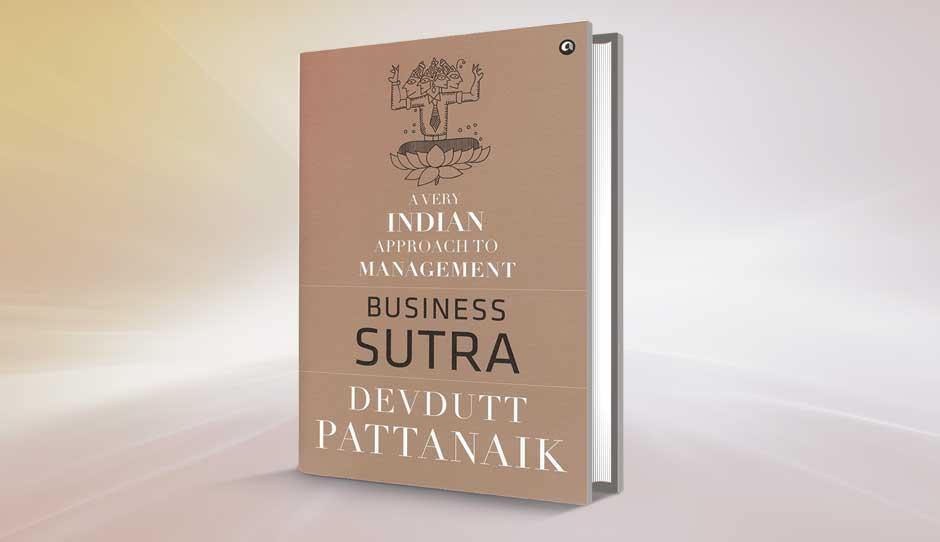3 Key Takeaways From Devdutt Pattanaik’s Management Mantra
- BY MYB
 In Aspire & Lead
In Aspire & Lead 13641
13641 0
0

They say one’s life choices, when seen in retrospect, say a lot about one’s personality. Going by that mantra, Devdutt Pattanaik is clearly an eccentrically brilliant man and his latest book Business Sutra: A Very Indian Approach to Management is testament to that. Starting off as a physician, Pattanaik trained to be an executive in the healthcare industry. As the years passed, he found himself portraying the role of a business analyst and guru. Now, he appears to have become the most intriguing mythologist India has seen in recent years.
It is with this background that the man combines ‘management’ including all its western notions of shareholder prices and deadlines, with Indian mythology and our perception of the world in relation to the Indian goddess of wealth and prosperity, Lakshmi. A refreshing change from the usual string of management books, this commentary by Pattanaik prescribes some essential takeaways for all budding or rising entrepreneurs, three of which have been summarised below:
While western management sutras teach one to chase wealth determinedly, the Indian way of management teaches one to attract wealth.
Pattanaik reminds us how true wealth and happiness only comes our way when Lakshmi walks into our homes and business, and not when we chase her. In the Puranas, Vishnu earns Lakshmi’s loyalty and service by working for the betterment of the world through his avatars. Hence, where he lived was filled with prosperity and happiness, and rightly called rang-bhoomi. Swarga, or heaven, on the other hand, the land of the gods is called rana-bhoomi, or the battle ground as they constantly fight with the devils to chase them away and keep Lakshmi safe and all to themselves.
While the model of capitalism as propounded by Adam Smith is based on the fundamental premise that the internal rate of return should be much greater than the social rate of return for guaranteed profit, Pattanaik illustrates through images and Indian mythology, that working towards a larger vision with the service a business seeks to offer and not glaring at the bottom line, is what will ultimately succeed in the Indian market. Don’t aim to make your business a Swarga, go for the more elusive Vaikuntha (Vishnu’s abode) - that’s what investors look for; a place their money will grow without obstacles at every turn.
There is no line between personal and professional beliefs.
Kishore Biyani, founder of the Future Group, paid Devdutt Pattanaik three times his salary to leave his job as a consultant at E&Y, to come join him as ‘Chief Belief Officer’. A role with no job description or deliverables, Pattanaik was hired to only make Biyani’s employees see the relationship between their beliefs and their business methods.
In the very first chapter, Pattanaik says:
Belief plays a key role in business: it determines choices and propels the decisions of buyers and sellers, regulators and shareholders, investors and entrepreneurs, employers and employees, vendors and customers. It determines how we do business and what ultimately gets done.”
Your personal beliefs, as a CEO or founder, are subjective to your social reality, which you hold onto as the objective truth. They are not separate from how you run your business. Pattanaik seeks to startle you out of the oblivion of this, and urges you to begin implementing your beliefs in a more active way. For instance, Indians have historically believed in the idea of nirguna, or the intangible, as opposed to the saguna, or the materialistic. If this belief was to be implemented in management and business, Pattanaik assures us that the result of choosing intentions over objectives would lead to the thriving global village the world needs.
Your teams are more than clumps of human resources that need to be managed.
Pattanaik says it is when people are treated as talent to be managed through compensation and manipulation that discord arises in a company. People are like tarahs, or stars and it is when they are strung together through an efficient management sutra, they form nakshatras that help us map an organisation and its culture. When treated like nameless, replaceable stars in a vast pool of talent, the harmony of the night sky or the organisation, in this case is disturbed.
Thus, even though the people individually may not impact the cumulative capability of the organization, it is the relationship between the nakshatras and the grahas (people who individually affect the organisation) that makes the growth path of business irradiate.
To the CEO or the budding entrepreneur with time to spare, this book is a must-read. Easy to read, but hard to assimilate only because it is laced with hard-hitting opinions or tippinis, this book will jolt its reader out of their familiar space of western management into the uncomfortable, yet even more familiar space of the Indian way of doing business. The book ends with a quirky section called “Reasons to reject this book” where Pattanaik puts it out there saying: “Devdutt Pattanaik will solve your problems.” While that might not be the author’s intent, by the looks of the book, he might just!





























Add new comment